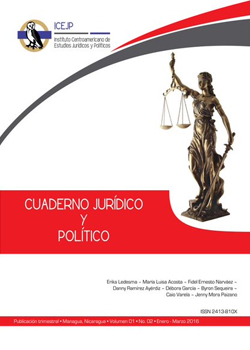Panoptic as an ideal design of the disciplines and emergency of the government of (in)security
An approach to Foucault's contributions
DOI:
https://doi.org/10.5377/cuadernojurypol.v1i2.10998Keywords:
Society, surveillance, discipline, institutions, power, subjects, docile bodiesAbstract
Foucault proposes that from 19th century prevails a disciplinary society, characterized by institutions that make up a diagram of domination; at first glance it may seem that they are completely different institutions, but as Foucault says these are institutions that have as common denominator the surveillance on the subjects, and used to produce a certain type of subject in society. In these societies are established an ideal model of panoptical prison, which aims to create docile subjects; this is a model that is extrapolated to different disciplines and knowledge. In this sense, the foucauldian analysis helps to understand to other authors, contemporary societies as the ideal of the disciplinary society within the framework of a form of power that does not disappear but suffer mutations. Interpreting to Foucault we can see that there is a new knowledge or Government of (in) security that brings about new technologies, practices, techniques, and devices that are articulated in the use of the power that is complex and abstract. From this, is to make a historical journey on the Panopticon model and its logic of regulation and the mutations found in today's society.
Downloads
269


 Cuaderno Jurídico y Político es de acceso abierto y permite la reproducción, la distribución y la comunicación pública solo para fines no comerciales
Cuaderno Jurídico y Político es de acceso abierto y permite la reproducción, la distribución y la comunicación pública solo para fines no comerciales 